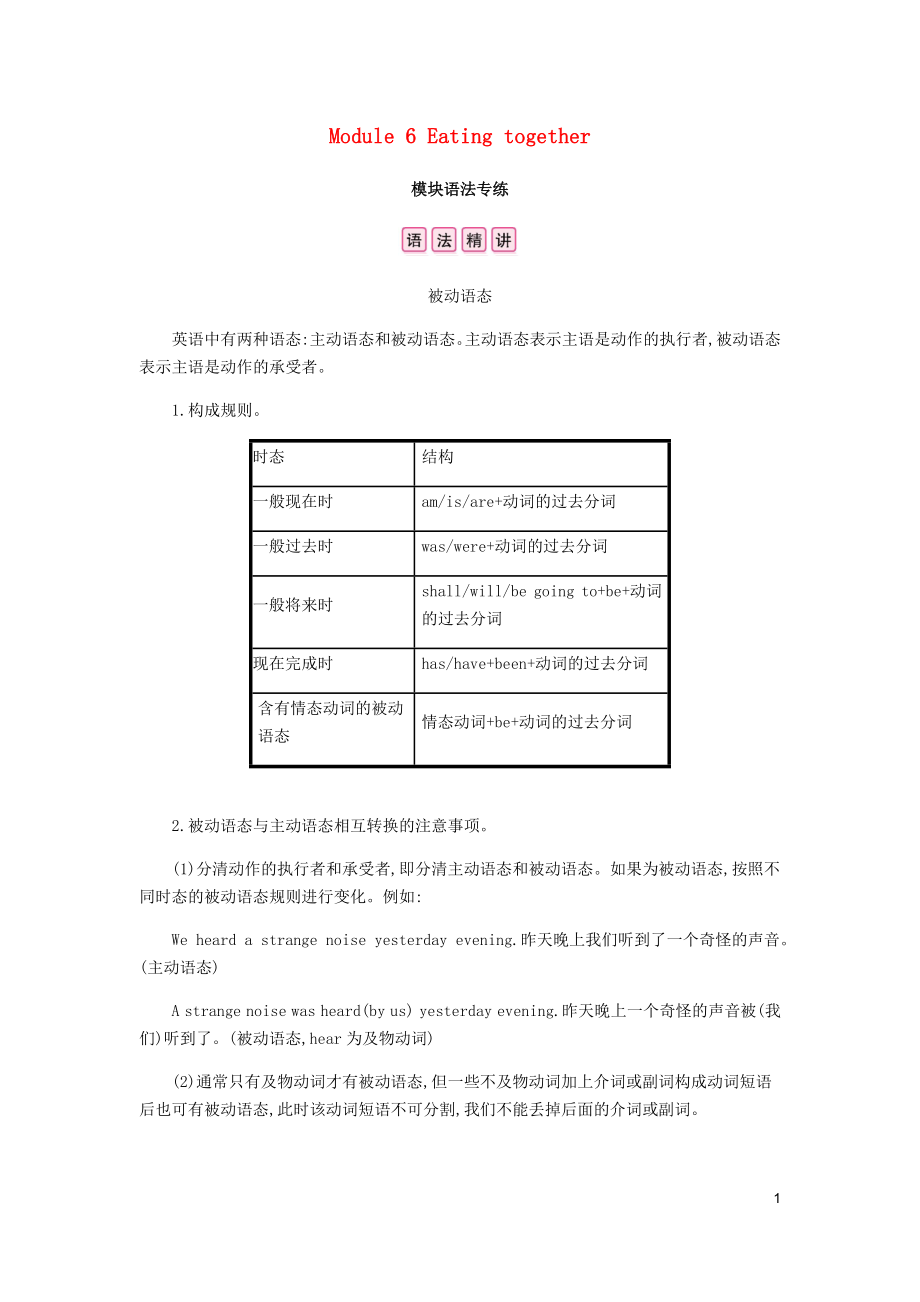《2019春九年級英語下冊 Module 6 Eating together模塊語法專練課時(shí)作業(yè) (新版)外研版》由會(huì)員分享�,可在線閱讀,更多相關(guān)《2019春九年級英語下冊 Module 6 Eating together模塊語法專練課時(shí)作業(yè) (新版)外研版(3頁珍藏版)》請?jiān)谘b配圖網(wǎng)上搜索��。
1���、Module 6 Eating together
模塊語法專練
被動(dòng)語態(tài)
英語中有兩種語態(tài):主動(dòng)語態(tài)和被動(dòng)語態(tài)����。主動(dòng)語態(tài)表示主語是動(dòng)作的執(zhí)行者,被動(dòng)語態(tài)表示主語是動(dòng)作的承受者�。
1.構(gòu)成規(guī)則。
時(shí)態(tài)
結(jié)構(gòu)
一般現(xiàn)在時(shí)
am/is/are+動(dòng)詞的過去分詞
一般過去時(shí)
was/were+動(dòng)詞的過去分詞
一般將來時(shí)
shall/will/be going to+be+動(dòng)詞的過去分詞
現(xiàn)在完成時(shí)
has/have+been+動(dòng)詞的過去分詞
含有情態(tài)動(dòng)詞的被動(dòng)語態(tài)
情態(tài)動(dòng)詞+be+動(dòng)詞的過去分詞
2.被動(dòng)語態(tài)與主動(dòng)語態(tài)相互轉(zhuǎn)換的注意事項(xiàng)��。
(1)分清動(dòng)作的執(zhí)行
2���、者和承受者,即分清主動(dòng)語態(tài)和被動(dòng)語態(tài)�。如果為被動(dòng)語態(tài),按照不同時(shí)態(tài)的被動(dòng)語態(tài)規(guī)則進(jìn)行變化。例如:
We heard a strange noise yesterday evening.昨天晚上我們聽到了一個(gè)奇怪的聲音���。(主動(dòng)語態(tài))
A strange noise was heard(by us) yesterday evening.昨天晚上一個(gè)奇怪的聲音被(我們)聽到了��。(被動(dòng)語態(tài),hear為及物動(dòng)詞)
(2)通常只有及物動(dòng)詞才有被動(dòng)語態(tài),但一些不及物動(dòng)詞加上介詞或副詞構(gòu)成動(dòng)詞短語后也可有被動(dòng)語態(tài),此時(shí)該動(dòng)詞短語不可分割,我們不能丟掉后面的介詞或副詞�����。
(3)主動(dòng)語態(tài)中使役動(dòng)詞make
3����、,let,have等和感官動(dòng)詞see,feel,hear等后常接不帶to的不定式,但在被動(dòng)語態(tài)中,常將to還原���。例如:
The boss made the children work over twelve hours every day in the past.在過去,老板讓孩子們每天工作超過12個(gè)小時(shí)。(主動(dòng)語態(tài))
The children were made to work over twelve hours every day (by the boss) in the past.在過去,孩子們被(老板)要求每天工作超過12個(gè)小時(shí)����。(被動(dòng)語態(tài))
(4)帶雙賓語的主動(dòng)語態(tài)變?yōu)楸粍?dòng)語態(tài)
4、時(shí),可將其中的一個(gè)賓語變?yōu)楸粍?dòng)語態(tài)的主語,另一個(gè)不變�。一般是把間接賓語變?yōu)楸粍?dòng)語態(tài)的主語,如把直接賓語變?yōu)楸粍?dòng)語態(tài)的主語,則在間接賓語前加介詞for或者to。例如:
我的媽媽在我10歲生日那天送了我一件禮物�����。
My mother gave me a present on my tenth birthday.(主動(dòng)語態(tài))
I was given a present by my mother on my tenth birthday.(被動(dòng)語態(tài),間接賓語作主語)
A present was given to me by my mother on my tenth birthday.(被動(dòng)語
5�����、態(tài),直接賓語作主語)
Ⅰ.單項(xiàng)填空
(B)1.Look at our new school.It last year.?
A.built B.was built
C.is built D.will be built
(D)2.Justin is very surprised that all the houses in the village white.?
A.paint B.painted
C.are painting D.are painted
(C)3.In order to make our city more beautiful,more tre
6、es and flowers every year.?
A.will plant B.should plant
C.should be planted D.plant
(A)4.— free breakfasts in all schools in China??
—No,not yet.Only in the rural areas.
A.Are;served B.Do;serve
C.Are;made D.Do;make
(B)5.—Food safety is very important.
—So some rules to stop peopl
7����、e from polluting food.?
A.must make B.must be made
C.must made D.be made
Ⅱ.根據(jù)句意用所給詞的適當(dāng)形式填空
1.—Claudia,are you going to Jeff’s birthday party on Saturday?
—Unless I am invited (invite).?
2.—I am afraid that I can’t finish the task successfully.
—Don’t worry.You will be given (give) plenty of time to do it.?
3.When Tim was asked (ask) why he was late for school,he just kept silent.?
4.If you are given (give) something you don’t like,it should be pushed (push) to the edge of the plate.?
5.Selina was often heard to sing (sing) in the next room.?
3
 2019春九年級英語下冊 Module 6 Eating together模塊語法專練課時(shí)作業(yè) (新版)外研版
2019春九年級英語下冊 Module 6 Eating together模塊語法專練課時(shí)作業(yè) (新版)外研版

